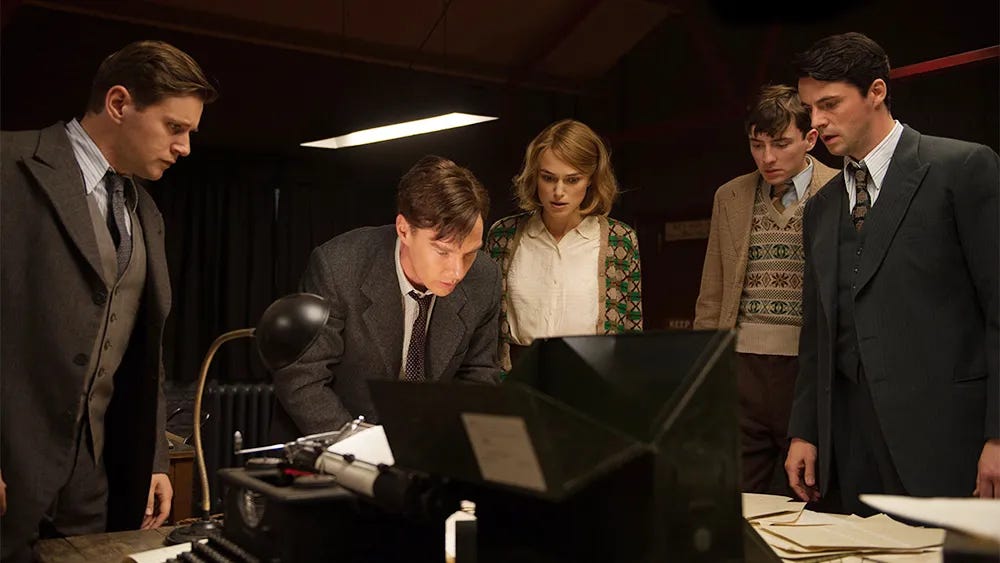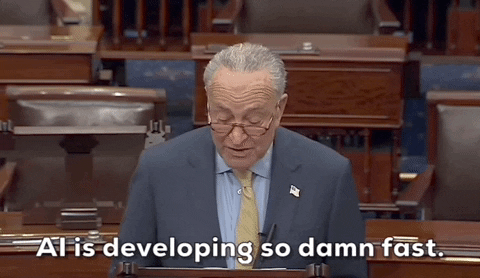Should AI Stay or Should AI go?
The AI Global Safety Summit is kicking off next week at Bletchley Park, the home of modern computing and the perfect place to discuss the future of artificial intelligence

The time has finally come: After the announcement of the PM Rishi Sunak at London Tech Week in June -where he stated that AI was a priority and that the UK should become a leading country on AI regulation - the country is getting ready to roll out the red carpet and welcome international tech leaders next week for the AI Global Safety Summit on 1st and 2nd of November.
And they couldn’t have picked a more emblematic location to host the first major global event on Artificial Intelligence: Bletchley Park, home to the Government Code and Cypher School during WWII - where codebrakers worked incessantly to crack the ciphered communications of the Axis block, most notably sent using the Enigma and Lorenz machines. Among these army of people who took residency at Bletchley trying to solve the mystery of encripted messages was Alan Turing, considered the father of Artificial Intelligence.
And here allow me a digression to urge you to watch The Imitation Game, a great film that focuses on Turing’s time at Bletchley leading up to the cracking of the Enigma code -which was a turning point in the course of war and gave a decisive competitive advantage to the Allied powers over Germany - and the unfortunate circumstances in which he was made to live afterwards.
For despite this extraordinary achievement and the contributions he made during his time at Bletchley, Turing’s work was ostracised for years on account of his homosexuality, for which he was prosecuted in 1952, ending with a public conviction that resulted in the removal of his security clearance to work for the government and a treatment of experimental chemical castration. Turing committed suicide two years after his conviction.
In 2009 thousands of people signed up a petition urging the UK Government to issue a posthumous apology for the way the scientist had been treated in his lifetime. While it was too late for Turing, he probably would be happy to know that the leading data and AI research centre in the country carries his name. And what better homage to his extraordinary contributions in computing science and artificial intelligence than to host the AI Global Safety Summit next week at the place that saw Turing at the top of his AI game in a key historical moment.
While the echoes of WWII have been long left behind us, it is fair to say that this too is a historical moment as global tech leaders will convene in a few days to discuss whether there should be a limit to what technology can achieve and how it should achieve it. In other words: how AI should be regulated.
A very important conversation as the summit will be attended by AI leaders, politicians and China, one of the leading AI powers, that has accepted the invitation to join the AI Safety summit although not without causing controversy among members of the Conservative Party.
However, Germany’s chancellor Olaf Scholz has declined the invitation, and so have Emmanuel Macron and Joe Biden. This may be a setback for Sunak, which according to the Financial Times is hoping to walk out of Bletchley Park with the announcement of an international advisory group on artificial intelligence.
Luckily for Sunak, the President of the European Commission Ursula von der Leyden is among the confirmed attendees. With a forthcoming EU AI Act, and with UK recently rejoining the EU’s Horizon research program, the presence of von der Leyden will ensure that the European agenda on AI is heard in the conversations at Bletchley Park. Especially after three of Europe’s main publishing trade bodies are urging the EU to act on ensuring transparency of generative AI models to protect not only rightholders but also the foundations of democracy.
The government has released the programme for the summit and judging by the look of it the question of safety will be a priority as will be conversations on the risks and opportunities of AI. No surprises here.
In fact a few recent announcement stress the importance the UK governemnt is placing on putting safety at the forefront of the conversation on AI and on becoming a global leader shaping the conversation around the technology.
Coinciding with the upcoming summit the Department for Science, Innovation and Technology (DSIT) has published a paper on the capabilities and risks of frontier AI. Meanwhile, the Frontier AI Taskforce, which was set up by the government back in the summer with Ian Hogart as its leader, is establishing an AI safety research team to assess risks in cutting-edge AI. To reinforce the message on how safety is a priority on the AI agenda, Rishi Sunak announced a few days ago the set up of the world’s first AI Safety Institute.
All very timely as the Online Safety Bill has finally received Royal Assent which means green light for the Ofcome to put all the new rules formally in law with will take a zero-tolerance approach to protecting children from online harm, while empowering adults with more choices over what they see online.
In June Rishi Sunak made his intentions clear when he announced that he wanted the UK to be at the forefront of the global AI conversation. The country may well be on the right path as an independent study by Oxford Information Labs has found that the UK’s AI Standards Hub -an initiative led by the Alan Turing Institute, the British Standards Institution (BSI) the National Physical Laboratory (NPL) to help stakeholders navigate and actively participate in international AI standardisation efforts - is leading the way and enhancing the United Kingdom's global prominence in shaping AI-related standards.
While Bletchley Park will be the home to the AI Safety Summit and will host global leaders who will convene to discuss all things AI, the AI Fringe will offer us common mortals the opportunity to engage in the conversations about the future of AI through a series of events that will take place between Monday 30th October and Friday 3rd November across London and the UK.
And of course there will be space to discuss the role of Artificial Intellegence in Creative Industries. Yours truly will be in fact moderating a fireside chat at the British Library as part of the session on Artificial Intelligence and Creativity, where I’ll have the opportunity to discuss with content creators Molly Smitten-Downes, Lawrence Essex and Justin Hackney the impact of AI for their respective industries and how we can leverage technology to enhance human creativity, not replace it.
The event is already sold out but if you are interested in understanding further the risks and opportunities of AI for Creative Industries, the AI Fringe has also organised an online session on Thursday 2nd November delivered by Linden Walcott-Burton from the Greater London Authority that will explore how artificial intelligence is disrupting the film, games, music and fashion industries.
And in fact disruption is perhaps the right word for the tsunami that artificial intelligence has unchained after its rapid ascend and its capacity to enter spaces that we considered the sancta santorum of what makes us irreplaceable: creativity.
From an AI-generated image winning a photographic competition to the Hollywood strikes, musicians divided between launching AI software that allows others to use their voice while others fight for their content not to train chatbots, Amazon requesting self-published authors to disclose any AI-generated content -and setting a limit of 3 self-published books per day- and even Sci-Fi publishers rejecting manuscripts generated for AI -wouldn’t that actually be a great plot for a sci-fi book?-, it is clear that the meaning of creativity and the value we attach to it is being redefined by the irruption of artificial intelligence in our lives and the possibility technology has to generate synthetic content.
In this historical moment of transformation, I’m really looking forward to facilitating a conversation that promises to raise many philosophical questions around what makes us irreplaceable in the era of AI, the value of human creativity, and how we can ensure technology can be a powerful tool to enhance it, but never replace it.
And on this note, I leave you with an extract from The Creative Act: A Way of Being by acclaimed musical producer Rick Rubin:
“Creativity is not a rare ability. It is not difficult to access. Creativity is a fundamental aspect of being human. It’s our birthright. And it’s for all of us. Creativity doesn’t exclusively relate to making art. We all engage in this act on a daily basis. […] Regardless of whether or not we’re formally making art, we are all living as artists. We perceive, filter, and collect data, then curate an experience for ouselves and others based on this information set. […] To live as an artis is a way of being in the world. A way of perceiving.”
And if you want to dig deeper into the topic of creativity and the creative process, this may be up your street:
Tech news
A year after Musk’s takeover, X says an average user spends 32 minutes per day on the platform
The UK lost out on over £2bn in tax in 2021 due to Big Tech moving their profits abroad, says TaxWatch.
Tech Nation has relaunched with Founders Forum and is aiming to help UK startups secure £10bn in funding over the next 5 years.
TikTok launches “refurbished technology” category where users can buy second-hand mobile phones and tablets.
Tata Group will start manufacturing iPhones in India for the local and global markets
Creative News
BAFTA has announced new initiatives and funding to help address socio-economic inequalities in film and TV.
National Theatre in London to pilot earlier start times as a result of work shift patterns post-pandemic.
The British Museum has set out plans to digitise over 1 million objects which have been found to be totally undocumented.
English National Opera is to axe 19 jobs from its orchestra and cut the sizeof its choir, too. Music director Martyn Brabbins has resigned at the news.
London Games Festival, the flagship games event in the UK supported by the Mayor of London, has announced the dates for its 2024 edition
Last but not least
Halloween is around the corner but this year it may be a very disappointing celebration, especially in the US as many may have to ditch their Barbie-inspired outfits.
The reason? As the actors’ strike is still ongoing, the Sag-Aftra is urging members to favour real people instead of fictional characters, as that could break the union’s rule amidst the strike.
After Barbie became the undisputed blockbuster of the year, the expectations for Barbie-inspired costumes this Halloween were high, especially as Ryan Gosling’s Ken performance received numerous accolades, which inspired many to dress like Barbie’s forgotten friend this Halloween.
No wonder that a group of Hollywood’s biggest stars have offered to chip in with $150m to help bring an end to the actors’ strike. I bet they all had already bought their Ken outfits weeks ago and were ready to rock any Halloween party with a rendition of Ryan Gosling’s dazzling musical number in Barbie.
And since Halloween is mostly an American tradition only recently adopted in Europe, this week I leave you with a pearl from Spain where a group of people try their best to wish each other a happy Halloween on whatsapp. Mariah Carey may have given the world a hymn for Christmas but in Spain we have these four people to thank for the perfect Halloween message that never fails to deliver year after year.
Have a good weekend!






